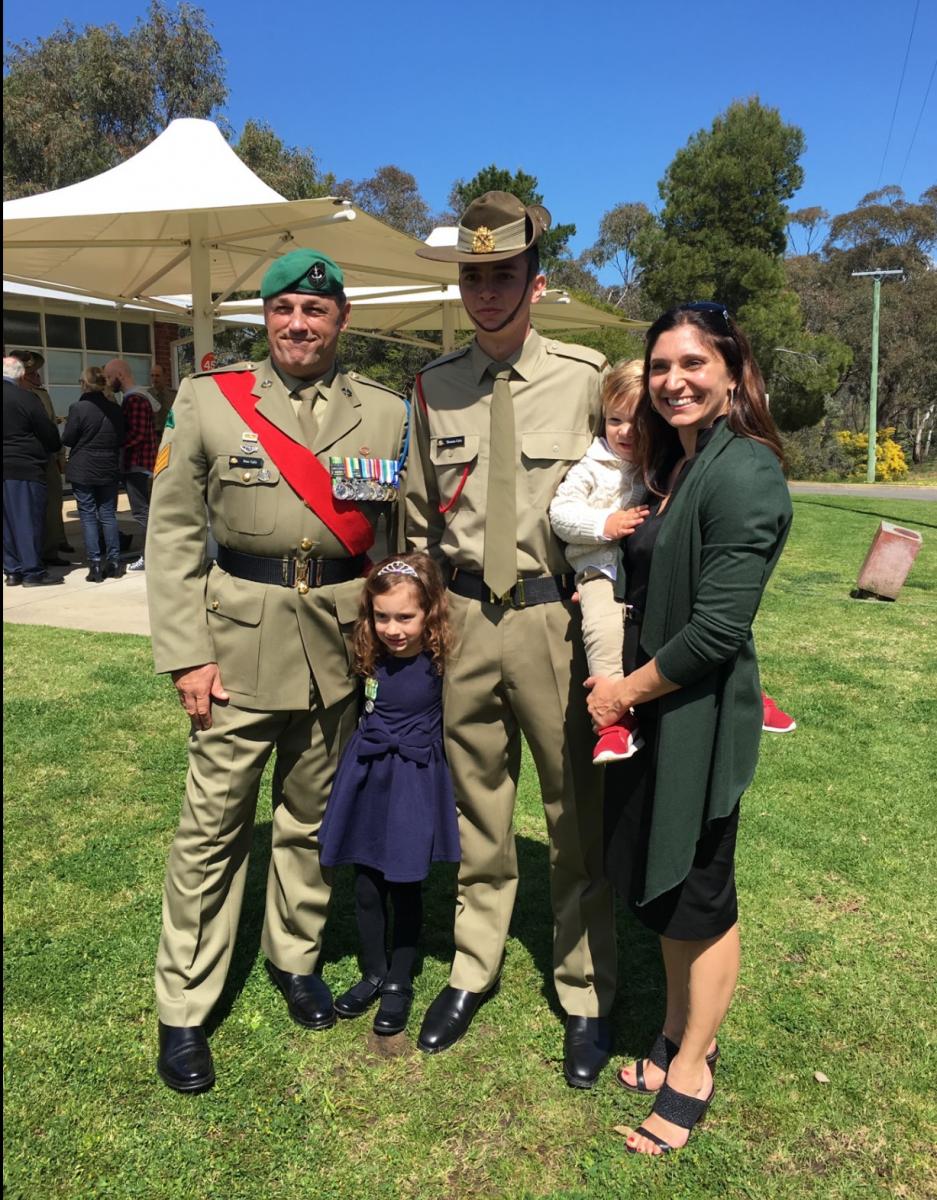Veteran Family Advocate Gwen Cherne
Though Gwen Cherne is very friendly, chatting to the new Veteran Family Advocate about her career is an intimidating experience. Born in the US city of Cleveland, she completed a bachelor’s degree in psychology and a master’s in public administration and international development. She volunteered in medical anthropology in Ecuador before graduating from university and becoming a social worker in Chile. She did disaster relief work in Peru, established a middle school in Brooklyn, then in 2006 went to Afghanistan as an aid worker where she remained on and off for the next three years.
‘I wasn’t given a security detail the first two times I was there, so I was allowed to go from town to town in old Toyota pick-ups, sometimes with a driver, sometimes driving myself,’ she laughs.

It was in Kabul in 2008 that she met Pete Cafe, formerly a soldier in the Australian Army, who was then doing contract security work. Their relationship blossomed, and in 2011 Ms Cherne moved to Australia to be with Pete who had re-enlisted in the Army in 2010. It was while he was deployed in Afghanistan as a Commando that the couple had the first of their two children.
Meanwhile, Ms Cherne worked for the Australian Civil-Military Centre undertaking civil-military-police projects, program management and research. Tom, Pete’s son from a previous relationship, moved in with them and later joined the Army. He is now a member of his father’s original unit – 3rd Battalion, the Royal Australian Regiment.
In 2016, while on deployment in Iraq, Pete suffered a stroke and was repatriated back to Australia. Tragically, nine months later, he died by suicide.
‘There are a couple of things for people to note,’ says Ms Cherne. ‘Not only am I a widow from suicide but I’m a mother of a current serving member. I took care of my husband in the nine months before he died, so I was also a carer. I’m not just a widow and I’m not just focused on suicide.’
Ms Cherne was until recently a board member of the Australian War Widow’s, NSW, appointed to the Council for Women and Families United by Defence Service, an Ambassador for the Commando Welfare Trust and Gotcha4Life, and in 2018 she was an Invictus Games Ambassador for ClubsNSW.
Among the things she is now focused on is supporting families and giving them a voice.
‘If veteran families are supported we can better support veterans. It’s about seeing the bigger picture, and remembering that military trauma affects the whole community.’
Ms Cherne began work on 24 August. Because the Advocate role is newly minted, she sees it as a great opportunity.
‘I was extremely happy when the creation of the position was announced and that it would be an integral part of how Government is addressing veterans’ issues. I applied because I felt that if I’m not part of the solution in a very direct way, then I can’t criticise the Government for what they are or aren’t doing. It comes down to this: I want to wake up every morning and help veterans and their families every single day. That’s what drives me.
‘Because I’m the first person in the position, I have the opportunity to grow it strategically so it impacts government over years. Part of the issue is making sure families are consistently in the forefront of people’s minds. It’s easy to forget families when you’re so focused on veterans. But even though I’m a one-woman show, I have strong support within the Commissions and DVA.’
Ms Cherne is also a member of the Repatriation Commission and, soon, the Military Rehabilitation and Compensation Commission as well being an ex-officio member of the Council for Women and Families United by Defence Service.
Among her first priorities is supporting the families in the wake of the Inspector-General of the Australian Defence Force’s report on the conduct of Special Forces personnel in Afghanistan. She is also keen to support the National Commissioner for Defence and Veteran Suicide Prevention when they’re appointed.
Ms Cherne points out that the causes of suicide are complicated. ‘It often has to do with trauma on top of trauma. Pete had experienced childhood trauma, deployment trauma, mental health problems, then a stroke. When you pile that much on someone, they hit a tipping point. Also, it’s often not the trauma so much as the life events – the breakdown of a marriage, the loss of a job that breaks them. Pete became violent, so I left and he became convinced I wasn’t coming back. For people struggling, these life events often are not manageable.
‘And they believe too, sadly, that we’ll be better off without them. It is not the case. My life is not better, my children’s lives are not better. His death has changed us forever. My children are twice as likely to die by suicide because their parent did. That’s something I think about every day. I make it clear to them that whenever I’m struggling, I seek help.’
Ms Cherne sees the way ADF personnel transition to civilian life as being key.
‘When I came home from Afghanistan, nothing compared to my time there. Everything seemed quite ordinary, even pointless. It takes a while to realise that painting rocks with your four-year-old is important.
‘Veterans are good at leadership. They need purpose, a sense of service and they need connection to the community. It’s been drilled into them that they are to serve and help people and that’s what they like to do. So it’s vital that we facilitate that.’

Gwen Cherne speaking at the Lifeline Canberra Women of Spirit Awards in 2018.

Gwen Cherne and Pete Cafe with their children Emily and Lachlan, and Pete’s son Tom at his March Out Parade at the Army Recruit Centre, Kapooka, NSW, in 2016.

Gwen Cherne with Prince Harry during the Invictus Games in 2019.
